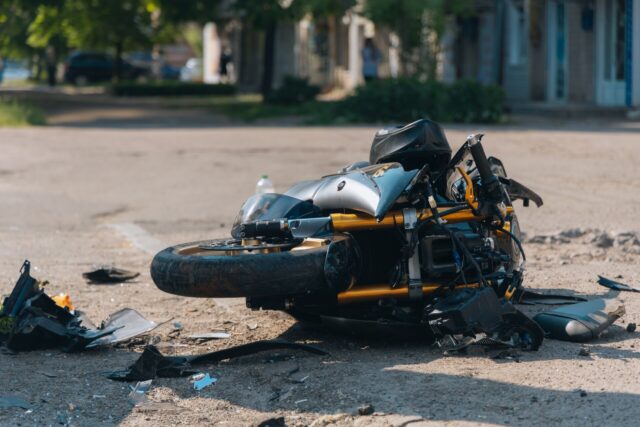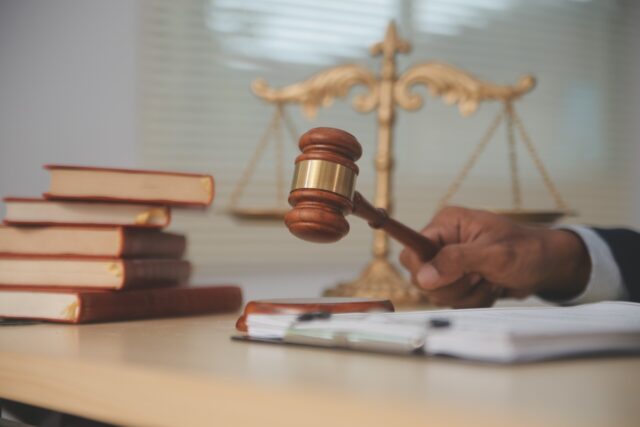From navigating the dynamic streets of Little Rock to winding through the scenic curves of the Ozarks, motorcycling in Arkansas delivers an experience unlike any other. It is more than just a hobby; it is a way of life. But when an accident happens, even the most cautious riders can face serious consequences. An experienced Arkansas motorcycle accident lawyer can be essential in these situations, especially if you were not wearing a helmet.
Recovery is more than physical healing. It also involves legal and financial challenges that require experienced guidance. At Caddell Reynolds Law Firm, we support injured riders across Arkansas, including in Fort Smith, Fayetteville, and Jonesboro.
If you’ve been injured in a motorcycle accident, regardless of helmet use, we are here to discuss your legal options. Call (479) 782-5297 today for a free and confidential consultation with a dedicated Arkansas motorcycle accident attorney.
Understanding Arkansas Motorcycle Helmet Laws
 Arkansas has specific regulations regarding motorcycle helmet use, but the law does not require all riders to wear one. Knowing which rules apply to you is an essential part of understanding your rights after an accident.
Arkansas has specific regulations regarding motorcycle helmet use, but the law does not require all riders to wear one. Knowing which rules apply to you is an essential part of understanding your rights after an accident.
Under Arkansas Code Ann. § 27-20-104, all motorcycle operators and passengers under the age of 21 must wear a helmet. This rule also applies to anyone riding with a learner’s permit, regardless of age. However, riders who are 21 or older and hold a valid motorcycle license are not legally required to wear a helmet in Arkansas.
Although helmets may not be mandatory for all riders, many choose to wear them to reduce the risk of serious injury. Helmets can play a critical role in preventing or minimizing head injuries during a crash. Still, whether you were wearing a helmet can become a complicated legal issue if you pursue a personal injury claim.
How Not Wearing a Helmet Can Affect Your Motorcycle Accident Claim
If you were involved in a motorcycle accident in Arkansas and were not wearing a helmet, you may still be eligible to recover compensation. However, the absence of a helmet may complicate your case due to Arkansas’s modified comparative fault system.
Understanding Modified Comparative Fault in Arkansas
Arkansas applies the modified comparative fault rule, outlined in Arkansas Code Ann. § 16-64-122. This rule allows you to recover compensation even if you are partially responsible for your injuries, but your recovery will be reduced by your percentage of fault.
For example, if you are found to be 20 percent at fault, your total compensation would be reduced by 20 percent. If you are found to be more than 50 percent at fault, you may be barred from receiving any compensation at all.
In motorcycle crash cases, legal arguments often focus on whether the injured rider shares any blame for the severity of their injuries or for the accident itself.
How Helmet Use May Affect Injury Claims in Arkansas Motorcycle Accidents
If you suffered a head injury while not wearing a helmet, the insurance company or defense attorneys may argue that your decision contributed to the seriousness of your injuries. Their goal is to reduce the amount their client must pay by shifting some of the blame onto you.
It is important to understand that this argument typically does not suggest you caused the accident. Instead, it focuses on whether your injuries could have been less severe if you had been wearing a helmet. This distinction matters when determining your share of fault.
An experienced Arkansas motorcycle accident lawyer can help counter these claims by emphasizing the actual cause of the accident and holding the negligent party accountable. Your attorney will also work to demonstrate the full extent of your damages, regardless of helmet use.
Proving Negligence in an Arkansas Motorcycle Accident
Whether or not you were wearing a helmet, the foundation of your claim depends on proving that the other party was negligent and caused the accident. Demonstrating this link is an important step in seeking compensation for your injuries and other losses.
Common Causes of Motorcycle Collisions
 Motorcycle crashes frequently stem from driver negligence, often due to a lack of awareness or care when sharing the road with motorcycles. Some common factors include:
Motorcycle crashes frequently stem from driver negligence, often due to a lack of awareness or care when sharing the road with motorcycles. Some common factors include:
- Driver Inattention: Many drivers fail to see motorcycles, leading to collisions, especially during lane changes or turns.
- Distracted Driving: Drivers using cell phones or other electronic devices often divert their attention from the road, a hazardous practice highlighted by traffic safety organizations like the CDC, putting motorcyclists at risk.
- Failure to Yield: This is a frequent cause of motorcycle accidents, where drivers do not yield the right-of-way at intersections or during left turns.
- Speeding or Reckless Driving: Excessive speed or aggressive maneuvers by other drivers can lead to loss of control and severe impacts.
- Impaired Driving: Drivers operating under the influence of alcohol or drugs pose a severe threat to all road users, including motorcyclists, as evidenced by data from organizations like Mothers Against Drunk Driving (MADD).
By identifying these common causes and thoroughly investigating the circumstances of your crash, your attorney can build a compelling case that supports your right to compensation and holds the at-fault party accountable.
How Your Arkansas Motorcycle Crash Lawyer Builds a Case
An experienced Arkansas motorcycle crash lawyer will take a detailed and methodical approach to building your case. The goal is to prove that the other party’s negligence directly caused your injuries and losses.
This begins with securing key evidence, such as the official police report and any traffic citations issued at the scene. Your attorney will also interview and preserve statements from eyewitnesses who can provide valuable insight into how the crash happened.
In addition, accident scene photos and any available video footage will be carefully analyzed to support your version of events. Your lawyer may also work with accident reconstruction experts to determine the exact sequence of events that led to the collision.
Vehicle damage and debris patterns are reviewed to understand how the impact occurred and who was at fault. This comprehensive investigation helps your attorney present a clear, well-supported claim that shows how the other driver’s actions caused your motorcycle accident and the resulting injuries.
With strong evidence in hand, your Arkansas motorcycle accident lawyer can effectively negotiate with the insurance company or present your case in court if necessary.
Compensation Available After a Motorcycle Accident in Arkansas
If you were injured in a motorcycle accident in Arkansas and the other driver was at fault, you may be eligible to pursue financial compensation. Not wearing a helmet does not automatically prevent you from filing a claim. Understanding the types of damages available is key to evaluating the full value of your case.
Motorcycle accidents often result in serious injuries and substantial financial strain. According to public health data from agencies like the Centers for Disease Control and Prevention (CDC), traffic-related injuries carry a high economic cost each year, both in medical care and lost productivity.
Economic damages are intended to cover direct financial losses. These may include costs for emergency medical care, hospitalization, surgeries, follow-up appointments, physical therapy, and any future treatment you may require due to your injuries.
You can also recover lost wages if you are unable to work during your recovery. If your injuries limit your ability to earn a living in the future, compensation may include reduced earning capacity. Property damage, such as the cost to repair or replace your motorcycle and damaged gear, may also be included.
Non-economic damages compensate for personal, non-financial losses. These may include pain and suffering, emotional distress, and loss of enjoyment of life if your injuries prevent you from participating in everyday activities. You may also be eligible for damages related to scarring or permanent disfigurement.
An experienced Arkansas motorcycle accident lawyer can help calculate these damages and make sure your claim reflects both the financial and emotional impact of the crash.
Why You Need a Motorcycle Accident Lawyer in Arkansas
Motorcycle accident claims in Arkansas can be challenging, especially if the insurance company tries to use your helmet use, or lack of it, as a way to reduce your payout. A skilled motorcycle injury lawyer in Arkansas can protect your rights and fight for fair compensation.
Your attorney will handle all communication with the insurance company and gather key evidence to support your case. This may include police reports, witness statements, expert opinions, and accident scene analysis. A strong case can help prove the other driver’s negligence and defend against claims that your actions made your injuries worse.
If negotiations fail, your lawyer can present your case in court and advocate for full and fair compensation. With a deep understanding of Arkansas motorcycle laws and the state’s modified comparative fault rules, your attorney can provide strategic legal guidance every step of the way.
Contact an Arkansas Motorcycle Accident Lawyer Today
 If you or a loved one has been injured in a motorcycle crash in Arkansas, whether or not a helmet was worn, you still have legal rights. You may be entitled to compensation for your injuries, lost income, and other damages. Handling a legal claim on your own can be challenging, especially when you’re focused on recovery.
If you or a loved one has been injured in a motorcycle crash in Arkansas, whether or not a helmet was worn, you still have legal rights. You may be entitled to compensation for your injuries, lost income, and other damages. Handling a legal claim on your own can be challenging, especially when you’re focused on recovery.
An experienced Arkansas personal injury lawyer at Caddell Reynolds Law Firm can help. We represent injured riders across the state with practical advice, strong advocacy, and a commitment to getting results. Our team manages every aspect of your case so you can focus on healing and moving forward.
Take the first step toward protecting your future. Call Caddell Reynolds Law Firm at (479) 782-5297 for a free, confidential consultation.
FAQs for Arkansas Motorcycle Accident Lawyers
Is it illegal to ride a motorcycle without a helmet in Arkansas?
Arkansas law requires all motorcycle operators and passengers under 21 years of age to wear a helmet. Riders with a learner’s permit must also wear a helmet, regardless of their age. If you are 21 or older and have a valid motorcycle license, you are not legally required to wear a helmet.
If I wasn’t wearing a helmet, can I still file a claim for my injuries?
Yes, you can still file a claim. Not wearing a helmet does not automatically prevent you from seeking compensation if another party was at fault for the accident. However, your decision not to wear a helmet may be used by the opposing side to argue that you contributed to the severity of your head injuries, potentially reducing the amount of compensation you receive for those specific injuries.
How does Arkansas’s “modified comparative fault” rule apply to motorcycle accidents?
Arkansas follows a modified comparative fault system. This means if you are found to be partially at fault for your injuries, your compensation will be reduced by your percentage of fault. If your fault is determined to be more than 50%, you may be barred from recovering any damages. Your helmet use might be considered a factor in contributing to injury severity, but generally not in causing the accident itself.
What types of damages can I potentially recover after an Arkansas motorcycle crash?
You may be able to pursue compensation for various damages, including medical expenses (past and future), lost wages and earning capacity, pain and suffering, and property damage (for your motorcycle and gear). The specific types and amounts of damages depend on the unique circumstances of your case and the evidence presented.
Why should I hire an Arkansas motorcycle crash lawyer if I was injured?
An Arkansas motorcycle crash lawyer understands the complexities of state laws, including comparative fault, and how insurance companies operate. They can investigate the accident, gather evidence, handle all communications with insurers, negotiate on your behalf for a fair settlement, and represent you in court if necessary. This helps protect your rights and assists you in navigating the legal process.














